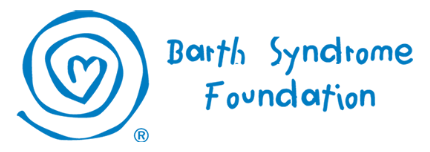[ad_1]

Barth Syndrome Foundation Logo
“Collaboration is a central tenet of our research program, and our effort with AHA serves as a template and an opportunity to mutually advance common research and clinical challenges with diseases that share a phenotypic overlap with Barth syndrome.”
BOSTON (PRWEB)
August 24, 2020
Barth Syndrome Foundation (BSF) and American Heart Association (AHA) have announced a first-ever partnership to advance research studying cardiac complications associated with Barth syndrome, a rare, life-threatening, mitochondrial disease. Structured as a fellowship, the partnership aims to also address a severe shortage of early-career researchers by incentivizing a focus on a rare indication. This important collaboration between the AHA and BSF marks a strategic shift by BSF to broaden its impact by joining forces to accelerate progress through science and education.
Barth syndrome is a rare, X-linked, inborn error of metabolism characterized by cardiomyopathy, cardiolipin deficiency, musculoskeletal weakness, neutropenia, debilitating fatigue, growth delay, and hypoglycemia, among other clinical manifestations. The disease most commonly affects boys and is associated with a genetic mutation in the TAZ gene (tafazzin) causing abnormal cardiolipin remodeling and impaired mitochondrial structure. As a result, over 70% of Barth syndrome patients present with cardiac complications. Specifically, dilated or hypertrophic cardiomyopathy, and left ventricular non-compaction contribute to heightened mortality and morbidity in the first year of life. 17% of patients with Barth syndrome ultimately receive a heart transplant due to cardiac failure, and 13% are treated with internal pacemaker devices due to life-threatening arrhythmias.
The AHA/BSF fellowship provides a research opportunity for an investigator to explore the underlying pathology of the cardiac abnormalities present in Barth syndrome and other diseases. “Supporting young promising researchers is an investment in both our research challenges now and scientific needs for the future. In partnering with the AHA, BSF is embarking on a model of engaging fellow philanthropic and institutional partners to address common scientific and clinical challenges that ultimately benefit all of our patient communities,” says BSF’s Director of Research Erik Lontok PhD. Since its founding in 2000, BSF has awarded $5.4 million dollars towards Barth syndrome research, which in turn has translated into $30.7 million dollars in follow-on funding. “Collaboration is a central tenet of our research program, and our effort with AHA serves as a template and an opportunity to mutually advance common research and clinical challenges with diseases that share a phenotypic overlap with Barth syndrome.”
Although Barth syndrome is an ultra-rare disease affecting around 250 known, living individuals worldwide, its multi-system and organ manifestations share many symptoms with other diseases and conditions. This partnership represents expansion of BSF’s portfolio targeting one organ system, with additional strategic partnerships with neuromuscular, metabolic, and immunocompromised disease groups anticipated in the near future.
ABOUT BARTH SYNDROME FOUNDATION
Barth Syndrome Foundation is the only global network of families, healthcare providers, and researchers solely driven by the mission to save lives through education, advances in treatment and finding a cure for Barth syndrome. BSF has funded nearly $5.4M USD since 2000 and catalyzed over $30.7M USD in funding from other agencies to advance global scientific discoveries to end the suffering and loss of life from Barth syndrome. Additionally, BSF provides a lifeline to families and individuals living with Barth syndrome around the world, offering 24/7 individualized support, educational conferences, a patient registry, as well as collaborations with specialist healthcare providers to define standards of care, treatment and rapid diagnosis.
Share article on social media or email:
[ad_2]

